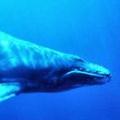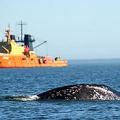 國際捕鯨委員會(IWC)的未來動向正處於緊要關頭。21日,IWC 75個會員國在安克拉治針對鯨魚議題展開激烈辯論,討論內容涵蓋,從現行的商業捕鯨禁令,到日本每年殺害數百隻鯨魚的「研究探勘」行動等。
國際捕鯨委員會(IWC)的未來動向正處於緊要關頭。21日,IWC 75個會員國在安克拉治針對鯨魚議題展開激烈辯論,討論內容涵蓋,從現行的商業捕鯨禁令,到日本每年殺害數百隻鯨魚的「研究探勘」行動等。
28日的開幕聲明中,日本表示,由於IWC的瓦解是「很有可能」的事,所以日本政府在2007年2月主導名為「捕鯨委員會正常化」會議。雖然有半數IWC會員國抵制該會議,但該會議產出的正式文件仍被列入議程,由IWC全體會員在一整個禮拜的會程中加以討論。
IWC正常化意味著當前的IWC運作「失常」。日本認為,這個創於1946年的機構,原本是為了訂定捕鯨規則而設的,因此現在IWC禁止捕鯨是「渺視國際法」的表現──這也是該次「IWC正常化」會議作成的結論。日本代表在開幕聲明一再強調這項結論,表明IWC應撤銷捕鯨禁令的立場。
日本代表指出,捕鯨禁令將符合「永續利用資源」原則的捕鯨活動排除在外,正顯示了IWC的運作失常。日本主張IWC在處理捕鯨規定方面過於感情用事,在協商期間,各國也並未秉持正確的觀念。
 在此同時,IWC的科學研究委員會28日發出警訊,西太平洋灰鯨族群,很可能在2050年以前就會滅絕。目前灰鯨族群的分布範圍,僅南從韓國,北至鄂克霍次海。這些灰鯨受到的威脅,來自俄羅斯開採石油和天然氣,以及日本和韓國設下的捕鯨網。
在此同時,IWC的科學研究委員會28日發出警訊,西太平洋灰鯨族群,很可能在2050年以前就會滅絕。目前灰鯨族群的分布範圍,僅南從韓國,北至鄂克霍次海。這些灰鯨受到的威脅,來自俄羅斯開採石油和天然氣,以及日本和韓國設下的捕鯨網。
The future of the International Whaling Commission as a whole is at stake this week as delegates from the 75 IWC member nations debate issues that range from the current moratorium on commercial whaling, to Japan's research whaling expeditions that kill hundreds of whales each year.
In its opening statement today, Japan said that because it views the collapse of the IWC as a "real possibility," the government of Japan hosted a conference on "Normalization of the IWC" in February of this year. Half the IWC member nations boycotted the conference, but still the outcome document is on the agenda for discussion by the full IWC this week.
To Japan, normalization means that the IWC is "dysfunctional" because the body originally was established in 1946 to set rules for the harvest of whales. Now that the moratorium is in place the IWC shows "disregard for international law," the normalization conference concluded.
The IWC should drop the moratorium, the normalization conference decided, a position the Japanese delegate repeated in his opening statement in Anchorage today.
Japan says the IWC is dysfunctional because the moratorium excludes whales "from the principle of sustainable use of resources." Japan argues that the IWC has become too emotional concerning whales and that negotiations are not carried out in good faith.
Meanwhile, the IWC Scientific Committee warned today that the population of Western Pacific gray whales is likely to go extinct by 2050. The small population ranges from Korea in the south to the Okhotsk Sea in the north. These animals are threatened by oil and gas exploration off Russia and are also being caught in nets by Japanese and Korean fishermen.
全文及圖片詳見ENS報導




